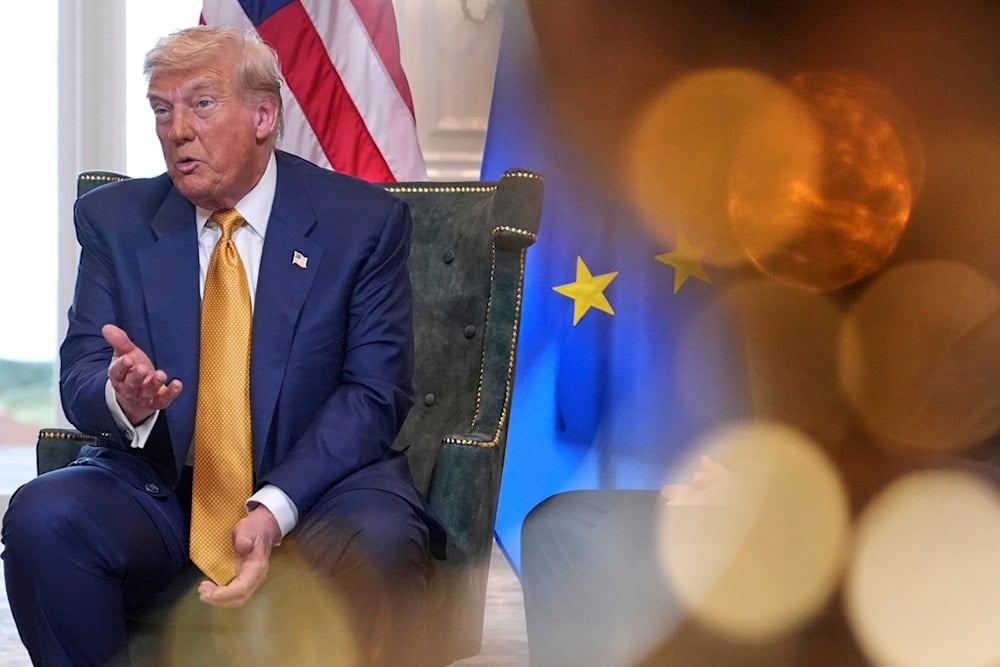Orban accuses von der Leyen of capitulating to Trump after trade deal
Viktor Orban blasts the EU-US trade deal, calling Ursula von der Leyen a "featherweight" after Trump imposes 15% tariffs and secures energy pledges.
-

President Donald Trump speaks as he meets European Commission President Ursula von der Leyen at the Trump Turnberry golf course in Turnberry, Scotland, Sunday, July 27, 2025 (AP)
Hungarian Prime Minister Viktor Orban sharply criticized European Commission President Ursula von der Leyen on Monday, accusing her of capitulating to the United States in a newly announced transatlantic trade deal.
The agreement, reached on Sunday between von der Leyen and US President Donald Trump, will see Washington impose a 15% tariff on most EU imports. Meanwhile, Brussels has pledged to increase purchases of American energy resources. The deal, presented as a stabilizing measure to avert a broader trade war, has instead drawn criticism from across Europe’s political spectrum.
“It wasn’t a deal that President Donald Trump made with Ursula von der Leyen. It was Donald Trump eating Ursula von der Leyen for breakfast,” Orban said on his podcast, calling the European Commission president a “featherweight” in negotiations. The Hungarian leader, renowned for his anti-EU stance and support of Trump’s MAGA movement, added that the US-UK trade pact was far better than what Brussels had secured.
Euroskepticism meets centrism
Hungarian Foreign Minister Peter Szijjarto echoed the criticism, writing on X that the agreement was “another sign that Brussels needs new leadership.”
Orban’s comments were echoed by other Euroskeptic leaders, including Germany’s far-right Alternative für Deutschland (AfD) party head Alice Weidel and French nationalist figure Marine Le Pen, both of whom characterized the deal as lopsided and harmful to European economic interests.
But criticism was not limited to the far right. Centrist French Prime Minister François Bayrou also condemned the deal on X, writing, “It is a dark day when an alliance of free peoples, united to assert their values and defend their interests, resigns itself to submission.”
EU leaders defend trade deal
Despite the backlash, several EU leaders defended the agreement, emphasizing the importance of avoiding further trade escalation with Washington.
German Chancellor Friedrich Merz described the outcome as pragmatic, warning that a no-deal scenario would have disproportionately harmed Germany’s export-driven economy.
Similarly, Italian Prime Minister Giorgia Meloni characterized the pact as “sustainable,” praising its potential to bring long-needed predictability to transatlantic commerce.
Contentious deal reached
A contentious trade agreement between the US and EU, finalized at Donald Trump’s Scottish golf resort, has drawn sharp rebuke from France and German industry groups. While the deal averts steeper tariffs, critics say it imposes unfair burdens on European exporters and marks a troubling shift in transatlantic relations.
The new US-EU trade agreement, sealed on Sunday in a ballroom at Trump’s golf resort in Scotland, introduces a 15% tariff on nearly all European exports to the US, including automobiles. While the deal averts Trump’s looming August 1 deadline that threatened a 30% tariff hike, it falls short of the zero-tariff trade framework initially proposed by the EU.
The accord subjects EU exporters to significantly higher duties, replacing the current average tariff of 4.8% with rates more than triple in some sectors. Negotiations are still ongoing regarding steel, which remains under a 50% tariff, as well as aviation and pharmaceutical exports, which face continued uncertainty.
Markets react to tariff relief
Despite the criticism, European stock markets responded positively to the resolution. Germany’s DAX climbed by 0.86%, while France’s CAC 40 rose by 1.1% on Monday, driven by relief that a damaging escalation had been avoided.
Ireland, one of the EU’s leading exporters to the US, cautiously welcomed the stability brought by the deal but expressed regret over the baseline tariff. Italy’s UniCredit bank was more blunt, describing the outcome as “heavily asymmetrical” and skewed in favor of Washington.
German bank Berenberg said Trump secured a clear political win, arguing the agreement left Europe worse off than before his tariff campaign began. “The extra US tariffs will hurt both the US and the EU,” said chief economist Holger Schmieding. “For Europe, the damage is mostly frontloaded.”
Von der Leyen acknowledged the imbalance, calling the 15% tariff “not to be underestimated” but the most favorable outcome under the circumstances. She had initially tried to pressure Washington with a suspended €21bn retaliatory list, later escalating to €73bn in potential levies.

 4 Min Read
4 Min Read









